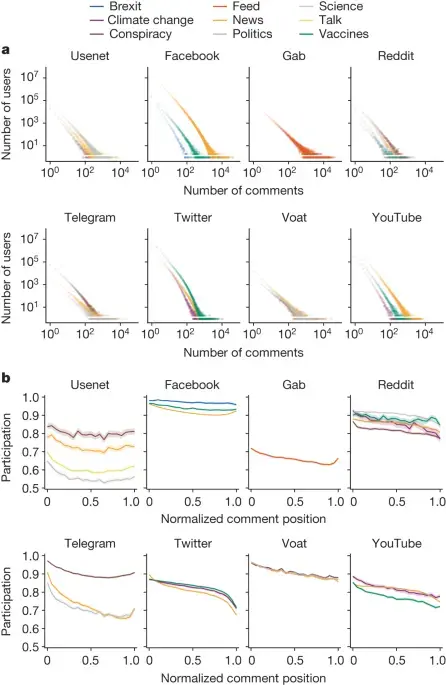alyaza [they/she]
internet gryphon. admin of Beehaw, mostly publicly interacting with people. nonbinary. they/she
- 196 Posts
- 94 Comments

 0·27 days ago
0·27 days agoalso in Israel news today is this–the probable shutting down of Al Jazeera’s operations there. Netanyahu says he’ll act swiftly to request the outlet be banned under this new law

 0·28 days ago
0·28 days agothe strategy here appears to be that Israel is trying to bait Hezbollah into attacking them, which is a very sane strategy and not at all completely psychotic

 0·1 month ago
0·1 month agowithout reducing them each as persons into cartoon villains in my mind
if you “reduced them to cartoon villains” they would literally be less evil than they actually are. Republicans writ large would gladly kill billions of people if it kept the fossil fuel money going—and we know this because they are actively choosing to do that by denying climate change and making it as difficult as possible to move away from fossil fuels as we speak

 0·1 month ago
0·1 month agoNot one person on Earth would raid the capital building for Jeb Bush.
people literally did this to disrupt the 2000 recount in Florida on behalf of George W. Bush, Jeb’s careerist failbrother. you cannot seriously think this is only a populist thing

 0·1 month ago
0·1 month agoAs much as they’d like to deny it, they are responsible for the rise of Trump and extremism.
reducing voters to brainless automata who have no agency in the rise of fascism is a good way to completely neuter your ability to actually combat fascism because many Americans are active participants to the project of building fascism, not idly going along because of partisan voting. bluntly: if fascism had no base, elevating it wouldn’t work in the first place

 0·1 month ago
0·1 month agoI have no doubt that many republicans would abolish democracy in a heartbeat if they themselves could, without risk, become the autarch…
but then you’re making my argument even more compelling for why literally none of these people should be trusted and none of them are moderate or should be treated that way (i.e. that it doesn’t matter which one you elect, so the ones who are most open and unelectable should be elevated)–they’re just Fascists In Waiting too; treating them as banal when by your analysis they aren’t would be akin to ignoring your HIV because it hasn’t started blatantly killing you yet

 0·1 month ago
0·1 month agoThey did break with Trump. They did certify the election.
if your bar for “Republicans demonstrating their desire to overthrow democracy” cannot realistically be met until they actually do that then i think your bar is bad and hopelessly naive, because at that point neither you nor i will live in a democracy and the bar will cease to be relevant.
but even entertaining this bar for some reason: please remind me how many of these people then supported actually prosecuting Trump for extremely unambiguously committing several crimes, including attempting to overthrow the election and inciting a mob that threatened to kill all of Congress.[1] and let’s then take stock of how many Republicans who feigned shock and gall at the event subsequently act like all that never happened, openly apologize for it, or state they would refuse to hold Trump accountable for/actively support similar criminal actions in 2024. to say nothing of how many state Republican parties (Wisconsin, North Carolina, Michigan, Arizona), even pre-Trump, had fallen completely into believing that land should vote and that the only elections which count are ones they win. or how any initiative to ban gerrymandering or to abolish the undemocratic Electoral College is Democratic-led, because Republicans benefit from their continuation?
17 of 261, for anyone wondering. only six are still in Congress in large part because Republicans and the Republican base have purged them from the party ↩︎

 0·1 month ago
0·1 month agoYes, I actually do believe that many of the “moderate” Republicans are less ready and willing and downright excited to actually turn the government over to Trump, even if only because they know it doesn’t actually benefit them in any way to do so.
then respectfully: i think you are catastrophically naive. i do not believe this, i do not think “moderate Republicans” believe this, and i think the case for this is unimaginably weak given the history of the Republican Party and how they have governed across the board. in any just country i think we would ban the party outright and disqualify all current Republican officeholders as we briefly did with secessionists after the Civil War

 0·1 month ago
0·1 month agoA Trump endorsement is not by any means a death sentence for a candidate, but it very much is an assurance that candidate will be attacking vulnerable groups if they win.
…as opposed to all of the non-Trump endorsed candidates who don’t do this in the Republican Party. i’m sorry but this is unironically just laundering the fake idea that there are shades of difference in the Republican Party. there aren’t! this doesn’t matter! there are no moderate Republicans! the only difference between these people is how open they are about how much they want the people they don’t like to die! kill the idea that this party can be saved by trying to let the “moderates” win out–all they want is a Kinder, Gentler Fascism that is harder to fight! literally every serious Republican politician is, at their core, a violent bigot–it’s the Republican brand and if they disagreed with violent bigotry they wouldn’t be Republicans!

 0·1 month ago
0·1 month agoThey are explicitly and intentionally trying to put people in greater danger,
how? again: in what ways would these people who aren’t Moreno differ in voting on legislation–which is the basis upon which people are in danger?
like, do you think Frank LaRose—who has a history of infringing on the right to vote, who has made it harder for people to vote, who defended the right of Republicans to gerrymander their way into power in perpetuity, and who wants abortion rights to be restricted in the same ways Trump does (and went out of his way to try and make this possible against the will of voters)—is a moderate? do you think he’d break with the party if asked? because i don’t. i think LaRose would be exactly like Moreno, just harder to beat because even people like you who are conscious of the creeping extremism incorrectly perceive him as more moderate even though he won’t be in any way that will matter if he’s elected.
or do you think that Matt Dolan—who, despite criticizing Trump for January 6th also said explicitly the last time he ran that he would not convict Trump if he ever had to vote on impeachment against him—is a moderate? do you think he’d break with the party if asked? because i don’t. i think Dolan would also be exactly like Moreno, just harder to beat for the same reasons i just described.

 0·1 month ago
0·1 month agoWhich is going to be impossible when those very Republicans and Independents think,
i’m sorry but, at the scale of the general electorate essentially nobody thinks this way and you might as well be making someone up accordingly. most voters–probably a minimum of half or more in almost all states–simply do not pay attention to or care about primaries (and indeed most election cycles only see majority interest in the general election beginning in August or later), and most people who show up in November will likely have not have voted in a primary at all.
additionally, it is well established that extremist candidates pay a penalty for being extremist or perceived as extremist: see for example Split Ticket’s electoral wins above replacement model

 0·1 month ago
0·1 month agoAnd guess what… they got what they wanted.
even without boosting, it is exceedingly likely Moreno would have won since he was Trump’s pick and got 50% of the vote in an FPTP race. it’s clearly not just the DNC who wanted this guy, but the base of Ohio Republicans

 0·1 month ago
0·1 month agoWhat it says is “Our candidate is so lackluster and uninspiring that they can only beat the most out there fringe lunatic”.
ignoring that i don’t think this applies to Sherrod Brown: Ohio is firmly a red state at this point which has trended rightwards in the past three presidential elections (and which voted for Trump by 10 points twice–presumably it will do so again in 2024) so… yeah. the path to victory here at this point just runs through winning over some Republicans and most Independents. pretending otherwise would be malpractice–the “base” is not sufficient anymore to win Ohio. so the easiest way to win now is to run against a fringe lunatic. and it’s not like there’s a meaningful difference in voting record in the Senate between so-called “moderate Republicans” and the “fringes” anyways–Murkowski and Collins still vote with their party on any actually good legislation and refuse to gut the filibuster that would allow for things to be passed by simple majority
I don’t follow the development super closely so I don’t know if those issues were resolved or not. I just remember a lot of discussion on it when I was first on Lemmy on a different instance.
not that i’m aware of, and fixing a database schema once it’s already in place tends to be a clusterfuck so i’m very skeptical it will get better any time soon

 0·1 month ago
0·1 month agoSilver was correctly giving better odds of Trump winning than basically any other prognosticator in 2016, but i think even he would agree with the point that past success is not strictly indicative of future results. that he got 2016 correct does not mean his analysis today will hold up well (and indeed there are a few reasons to think he is a worse, more partisan, more rigid-in-approach-and-analysis prognosticator now than he was in 2016, some of which i touched on here).
circumstances have also changed, in any case: polling is struggling to methodologically keep up and capture representative samples in a way they simply wasn’t true in 2016. we saw subsample results like what we’re seeing now in a few 2022 state-level polls and they were wrong then, and additionally no elections have yet convincingly or reliably demonstrated the kinds of shifts being implied currently. even discounting special elections, it seems very clear for example that Republicans did not get 20% of the black vote in Virginia in 2023 based on their House of Delegates results. by far the most compelling argument i’ve seen that accepts current polling data at face and not as error is the argument by Nate Cohn that Democratic weakness is among non-voters–but that obviously invites the question of: why should we assume these people will vote in 2024?

 0·1 month ago
0·1 month agoHe’s essentially the pre-eminent expert on polling, polling errors, and best practices in that regard.
i would not call Silver this anymore; he’s an increasingly partisan libertarian with weird hangups and a stick up his ass about things he wishes he understood (like COVID-19), and it’s almost assuredly part of why he’s out of a job at 538. he’s also increasingly being lapped by people like G. Elliott Morris and an armada of Twitter-based election analysts and prognosticators. at the bare minimum he’s absolutely not the only guy in town on this, and some of the people i just described like Adam Carlson actively dispute he’s even using the data in this article correctly because they’re the ones who made it. he’s also being challenged on his points here by professors like Matt Blackwell, specific polls of Black voters and data about minority youth voters. in general: the case is not nearly as clear-cut as he makes it seem and deferring to him on this would be a bad case in which to do it, because he’s probably wrong.

 0·2 months ago
0·2 months agoWith approximately 600 members, Activision Quality Assurance United-CWA is the largest group of union-represented workers at any U.S. game studio. Workers in the new unit are located in California, Texas, and Minnesota. Over 1,000 video game workers at Microsoft now have union representation with CWA.
this is very cool, and hopefully more workers leverage the Microsoft neutrality agreement.

 0·2 months ago
0·2 months agoHamas lied about 500 dying in al Ahli hospital blast and blaming the IDF. They didn’t even try to offer evidence.
even granting this, this seems like the obvious exception to the rule. as the commenter you’re replying to noted, the UN and WHO have generally supported (with a handful of discrepancies that are unsurprising given the circumstances) the Gaza Health Ministry’s death tolls. Israel’s counts have also not historically diverged strongly from the ones the Gaza Health Ministry gives. take the 2014 war where the Gaza Health Ministry said 2,310 killed, the UN HRC said 2,251 killed, and Israel said 2,125 killed. that’s only a 10% difference which, if we’re being honest, is not really much of one in the context of an armed conflict.
mostly, where the Ministry and Israel meaningfully differ is in who they consider civilians and on what bases–the Ministry claimed about 70% civilians killed in 2014, but Israel claimed 36%. and that’s a much harder question to parse out than whether or not the Gaza Health Ministry is lying about casualty numbers–which by all accounts we have it does not seem to be.

 0·2 months ago
0·2 months agoThe right choices are generally more expensive (in terms of up-front costs, even if they’re less expensive in the long run) and/or require more time investment, both of which are lacking for the poor.
or just the non-technologically savvy. a lot of the issue here is a technological hurdle, fundamentally—it takes a certain level of technological knowledge for someone to, say, pirate ebooks versus just buying them legitimately and that’s a big point of friction for people in making the “right choice”. we have to keep in mind that for a lot of internet-using people nowadays, knowing the ins-and-outs of Facebook or how to download a browser add-on is probably a legitimate technical skill and on the upper bounds of what they’d know navigating spaces like this. and we don’t make it easy necessarily for people to acquire and advance the technological knowledge we’re talking about here either.



























this is actually quite cute, i think.